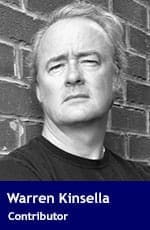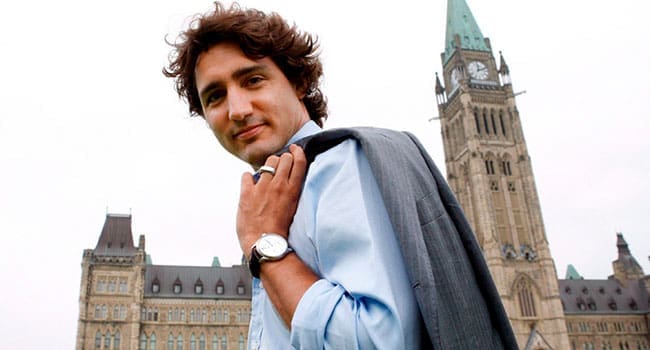 The first casualty of war isn’t truth. It turns out it’s meaning.
The first casualty of war isn’t truth. It turns out it’s meaning.
Ipso facto, is “Canada” in a state of “war” with “the Islamic State?” Prime Minister Justin Trudeau and Foreign Affairs Minister Stephane Dion emphatically state that we are not.
Said the Prime Minister on CBC radio: “A war is something that can be won by one side or the other and there is no path for ISIL to actually win against the West . . . They want to destabilize, they want to strike fear. They need to be stamped out.”
Said Dion, outside the Commons: “If you use the terminology ‘war,’ in international law it will mean two armies with respecting rules and it’s not the case at all. You have terrorist groups that respect nothing. So we prefer to say that it’s a fight.”
So, are they right? Trudeau’s argument is somewhat existential, or at least philosophical: he seems to believe that a war is only a war if it can be won. Dion is more preoccupied with semantics: it can’t be a war, because the Islamic State isn’t a state, and wars can only be waged by warring states.
Let’s dissect Dion’s assessment first, shall we? The Islamic State – which itself (naturally) lacks a name upon which all can agree – has many names. It has been variously referred to as ISIL (Islamic State of Iraq and the Levant), ISIS (Islamic State of Iraq and al-Sham), Daesh (an acronym derived from its Arabic name), terrorists, the enemy (my personal favourite, because it is truest) and so on. When our side cannot even figure out what to call the other side, confusion is inevitable.
But leave that aside for a minute. The trickier challenge is this: what, exactly, is the best way to describe what exists between us and Daesh/ISIS/ISIL/the enemy? Are we at war with them? Is it war’s lesser variant, an armed conflict? A mere “fight,” as Dion suggests? Is what Daesh/ISIS/ISIL/the enemy are doing properly classified – as Messrs. Trudeau and Dion do – as “terrorism,” stirring up fear, destabilizing, and so on? How about this: is it safe to say that we have a really strong disagreement with Abu Bakr al-Baghdadi, the putative head of the caliphate-to-be? No? Are we cross with him, yet?
It could be that the Canadian government – unlike many of its allies – does not want to describe our disagreement with Daesh/ISIS/ISIL/the enemy as “war” because that would confer status on the other side. It would ascribe legitimacy to them.
In international law, as our Foreign Minister implies, “war” has a very specific meaning. Its etymology is Old English (wyrre) and Old French (werre). Merriam-Webster (likely Messr. And Trudeau’s preference) says it is “a state of usually open and declared armed hostile conflict between states or nations.” The Oxford people (properly, in my view) state that it need not be between states – they say it need only be “a state of armed conflict between different countries or different groups within a country.”
If a tour of dictionaries isn’t sufficient, the United Nations – which is an authority in war, because it is the entity theoretically most preoccupied with preventing war – provides us with insight into why Canada’s Liberal government is so insistent that we are not in a state of war with Daesh/ISIS/ISIL/the enemy. The UN Charter specifically forbids war, except for self-defence, or if authorized by the Security Council itself. Which explains why so few nations, Canada among them, describe themselves “at war” with anyone anymore.
The United Nations (and, unsurprisingly so, to conservatives) is ultimately of no help in our definitional quest. The U.N. doesn’t even use the word “war” in the relevant section of its Charter. It is instead only concerned with what it calls “threats to the peace, breaches of the peace, or acts of aggression.”
There. We have met the U.N. threshold, then: Daesh/ISIS/ISIL/the enemy have repeatedly threatened our peace, they have breached our peace, and they have committed acts of aggression against us. And, as much as we do not want to admit it, the Islamic State meets the definition of “state” – they are politically organized, and they control territory.
So, we are at war with the Islamic State, the circumlocutions of the politicians notwithstanding. What now? Does anything really change?
No. The word games, at day’s end, are just that: games. This is indeed a war, with combatants, and casualties, and myriad horrors. There is a body count, and it grows.
Dance on the head of semantical pins if you like, politicians. Indulge in your preference for interminable semiology and exegesis. The rest of us know full well what this is.
We don’t, however, know how it will end.
Warren Kinsella is a Canadian journalist, political adviser and commentator.
The views, opinions and positions expressed by columnists and contributors are the author’s alone. They do not inherently or expressly reflect the views, opinions and/or positions of our publication.


